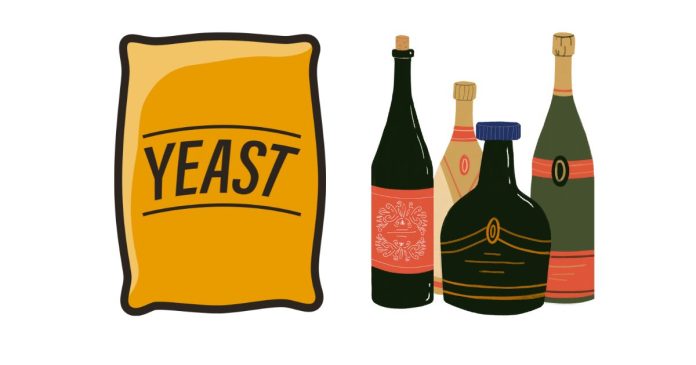Yeast plays a crucial role in the production of many alcoholic beverages, from beer and wine to spirits like whiskey and vodka. Without yeast, the process of fermentation would not be possible, and the distinctive characteristics of alcohol would be absent. But why exactly is yeast so important in creating these drinks? In this blog post, we’ll explore the role of yeast in alcoholic drink production and why it’s an essential ingredient in the brewing and distillation process.
Yeast and the Process of Fermentation
The primary reason yeast is important in alcoholic drinks is because it’s responsible for fermentation. Fermentation is the biochemical process where sugars, usually derived from grains, fruits, or other starches, are converted into alcohol (ethanol) and carbon dioxide by yeast. This process not only creates the alcohol itself but also contributes to the flavors and aromas that define different types of alcoholic beverages.
- What Happens During Fermentation? When yeast is added to a sugary liquid, it begins to consume the sugars and release alcohol and carbon dioxide as by-products. The alcohol is what gives the drink its intoxicating properties, while the carbon dioxide can contribute to the fizziness of drinks like beer or sparkling wine.
The Role of Yeast Strains in Flavor Development
Different strains of yeast produce different flavors and aromas during fermentation, which can significantly impact the taste and character of the final product. For example:
- Beer: In brewing beer, yeast strains can give rise to different flavor profiles, such as fruity, spicy, or earthy notes. The choice of yeast strain can help define whether the beer tastes like a crisp lager or a rich, malty stout.
- Wine: In winemaking, yeast strains can influence the flavor of the wine, producing a wide range of flavors from sweet to dry, and from fruity to floral. The terroir, or environmental conditions, can also play a part in how yeast behaves during fermentation.
- Spirits: In distilled beverages like whiskey or rum, yeast is used during the fermentation of grains or sugarcane. The choice of yeast strain can subtly affect the final flavor, especially after the distillation and aging processes.
The yeast’s fermentation process is not just about turning sugars into alcohol; it also creates a complex mix of compounds, such as esters and phenols, which contribute to the distinctive flavor profiles of different alcoholic beverages.
The Importance of Yeast in Carbonation
In addition to producing alcohol, carbon dioxide produced by yeast during fermentation is responsible for the natural carbonation in many alcoholic drinks. For example, beer, champagne, and certain ciders are naturally carbonated as the yeast ferments the sugars and produces CO2, which gets trapped in the liquid. This natural carbonation contributes to the fizzy and refreshing qualities of these drinks.
- Example: In the case of Champagne and other sparkling wines, a second fermentation takes place in the bottle, where yeast continues to produce carbonation. This process gives Champagne its signature bubbly texture.
Yeast and Alcohol Content
The amount of alcohol in an alcoholic beverage is largely determined by the fermentation process, which is directly influenced by the yeast used. Yeast has a tolerance level for alcohol, meaning that once the alcohol concentration reaches a certain point, the yeast will stop working. In some alcoholic beverages, the fermentation process is controlled to ensure a specific alcohol content, while in others, such as spirits, fermentation is just the first step before distillation, which increases the alcohol content.
- Beer and Wine: In beer and wine, the alcohol content typically ranges between 4% to 15%, depending on the yeast strain and fermentation conditions.
- Spirits: In distilled beverages, yeast helps create a higher alcohol content before the liquid is distilled and concentrated through the distillation process.
Yeast in the Brewing and Distilling Industry
Beyond its role in fermentation, yeast has become a specialized tool in the brewing and distilling industries. Brewers and distillers select specific yeast strains based on their desired outcome, such as the flavor profile, alcohol content, and carbonation level. Modern yeast strains are carefully cultivated and often selected for their ability to ferment efficiently, tolerate higher alcohol levels, or create specific flavors. This has led to the development of many unique and diverse types of alcoholic beverages.
- Craft Beer Revolution: In the craft beer movement, yeast has played a pivotal role in the experimentation with new flavors and styles of beer. From wild yeasts in sour ales to highly specialized strains used in IPAs, yeast is a key element in pushing the boundaries of flavor in the beer world.
Yeast is an indispensable component of alcoholic drinks, acting as the engine behind fermentation. It is responsible for turning sugars into alcohol, creating carbonation, and contributing to the complex flavor profiles that make each alcoholic beverage unique. Whether it’s the fruity aromas in wine, the fizzy bubbles in beer, or the smooth, rich flavors in whiskey, yeast plays a key role in shaping the taste, texture, and character of your favorite drinks.
Understanding the importance of yeast in alcoholic production helps us appreciate not only the science behind fermentation but also the artistry involved in brewing and distilling. So, the next time you enjoy a cold beer, a glass of wine, or a shot of your favorite spirit, remember that it’s the yeast working behind the scenes to create that perfect sip!


